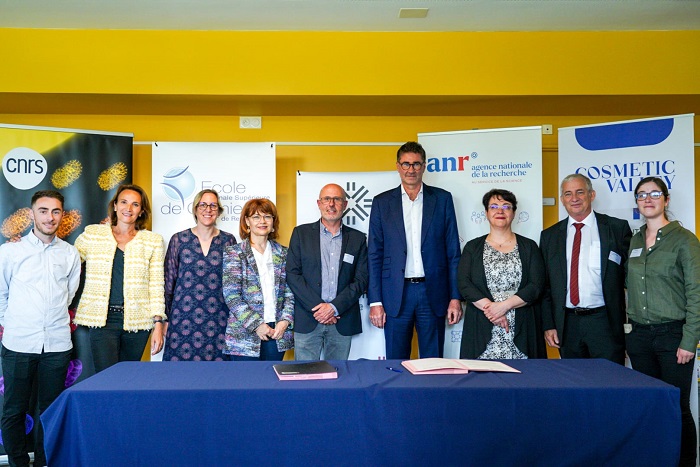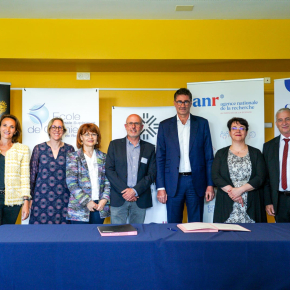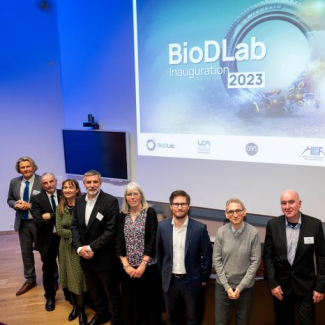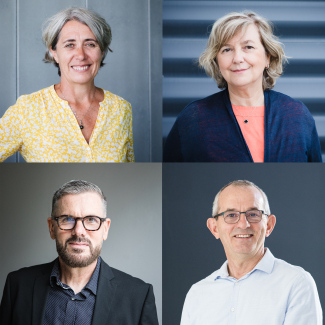A collaboration between public and private research to create the cosmetics of the future
CHANEL Fragrance & Beauty, a major actor in luxury cosmetics, and the CNRS, Rennes Graduate School of Chemistry (ENSCR), and the University of Rennes inaugurated the new associated research laboratory ICCARE (Innovative Cosmetics for CARE) in Rennes on Thursday 6 June 2024, with funding from the French National Research Agency (ANR). By pooling CHANEL Fragrance & Beauty’s expertise in developing and industrialising cosmetics products with that of the scientists from Rennes Institute of Chemical Sciences (CNRS/Rennes Graduate School of Chemistry/University of Rennes) in synthesis, catalysis, and green chemistry, the five partners will pursue innovation by creating next generation cosmetics products as part of an eco-design approach.
Cosmetics is the second leading contributor to the French balance of trade, with 60% of production being exported, representing a market of €30.4 billion1 . To preserve this enthusiasm for French cosmetics products, it is crucial to provide consumers with continuous and informed innovation, as well as to maintain product safety in light of evolving scientific knowledge, the environmental context, and applicable regulations. This involves continual optimisation of cosmetics ingredients, all while pursuing an eco-design approach that improves the life cycle of finished products.
In order to overcome major technological obstacles, the teams contributing to this collaboration between public and private research will focus on two major areas:
- creating innovative processes adopting an eco-design approach in order to synthesise and produce new inorganic pigments, which are essential ingredients because they constitute the colorimetric composition of various shades.
- producing agro-sourced waxes from non-food vegetable oil using processes with low environmental impact.
The research conducted within the ICCARE associated research laboratory will thus help create high-performance cosmetics products adhering to the principles of eco-design, in an effort to meet consumer expectations.
“The CNRS is thrilled about the signing of the first associated research laboratory with CHANEL Fragrance & Beauty, a flexible and enduring partnership between public and private actors. This creation grew out relations of trust with CHANEL Fragrance & Beauty over the last decade, in connection with the shared scientific challenge of inventing the cosmetics of the future. ICCARE more specifically seeks to create cosmetics that offer higher performance and are eco-designed, in line with the major challenges of the CNRS, including that of contributing to the environmental transition.”
Jean-Luc Moullet, CNRS Chief Innovation Officer.
“The collaboration of CHANEL’s R&D department with partners in public scientific research is essential to the continued creation of products that are both innovative and in keeping with their times. This associated research laboratory will pool our expertise, scientific knowledge, and know-how in order to develop future generations of raw materials. This scientific, human, and responsible project will pursue the continual improvement so crucial to meeting the future challenges of industry in general.”
Nathalie Volpe, Director of Innovation, Research and Development at CHANEL Fragrance & Beauty.
“This associated research laboratory is a fine example of how we can together help to establish chemistry as an essential actor in the transformation of our world.”
Audrey Soric, Director of Rennes Graduate School of Chemistry.
“The signing of the ICCARE associated research laboratory between the Rennes Institute of Chemical Sciences and CHANEL Fragrance & Beauty reinforces the dynamics of partner-based research in Rennes, and serves as an illustration of the special responsibility of the University of Rennes with respect to innovation in the service of society. By marshalling the expertise of the various research teams involved, this new public-private collaboration will create eco-designed and sustainable cosmetic products that help address the major challenge represented by the ecological and environmental transition.”
Muriel Hissler, First Vice-President, Vice-Chair of the Research Commission of the Academic Council of the University of Rennes.
“The ANR’s LabCom instrument strengthens partner-based research between the public and private sectors, and takes its place within the ANR’s larger approach fostering innovation. The measure supports actors in broader society and enterprises in their efforts to become more competitive and more capable of responding to issues relating to various transitions. We are therefore thrilled about the creation of the ICCARE LabCom, which will allow research teams from the CNRS, Rennes Graduate School of Chemistry, and the University of Rennes to work with those from CHANEL Fragrance & Beauty in order to create the cosmetics of the future.”
Dominique Dunon-Bluteau, ANR Scientific Operations Director.

© Pierre Theiller / CNRS.
Regarding the CNRS
A major player in basic research worldwide, the National Centre for Scientific Research (CNRS) is the only French organisation active in all scientific fields. Its unique position as a multi-specialist enables it to bring together all of the scientific disciplines in order to shed light on and understand the challenges of today's world, in connection with public and socio-economic stakeholders. Together, the different sciences contribute to sustainable progress that benefits society as a whole. (www.cnrs.fr)
Regarding CHANEL Fragrance & Beauty
CHANEL is a private enterprise that is a global leader in creating, developing, producing, and distributing luxury products. CHANEL Fragrance & Beauty’s Innovation, Research, and Development Department possesses strong expertise in cosmetics. It brings together a community of more than 300 passionate scientists who are at the cutting edge of innovation and excellence.
Regarding Rennes Graduate School of Chemistry
A public Grande Ecole, Rennes Graduate School of Chemistry (ENSCR) offers an advanced academic curriculum to train future engineers in key issues within the chemical industry, and prepares them to respond to the challenges of major transitions. It counts over 500 engineering and doctoral students. ENSCR also includes a team of academics who contribute each day to advancing science alongside enterprises. (www.ensc-rennes.fr)
Regarding the University of Rennes
Created on 1 January 2023, the University of Rennes brings together six faculties and five research clusters, as well as the École des hautes études en santé publique (EHESP), Rennes Graduate School of Chemistry, the École Normale Supérieure de Rennes, Sciences Po Rennes, and INSA Rennes. With its broad spectrum of training and research, as well as the advantages and distinctive features of its affiliated Grandes Écoles, the University of Rennes is striving to meet the major societal challenges of a world in transition, in particular in the fields of the environment, global health and digital technology. It fosters pedagogical innovation, providing its 35,000 students with an fulfilling experience, in addition to successful professional integration by promoting their freedom and their collective as well as individual success. Its role as a leading actor in lifelong learning also places it in a position of responsibility toward society, making it a key driver for the socioeconomic and cultural development of the territory. (www.univ-rennes.fr)
Regarding the French National Research Agency
As a public institution under the authority of the French Ministry of Higher Education and Research, the ANR is the funding agency for project-based research in France. It funds and promotes basic and applied research in all disciplines at the national, European, and international level. It also funds technological innovation, technology transfer, and partnerships between research teams from the public and private sectors, in addition to strengthening dialogue between science and society. The ANR also serves as the main operator of the France 2030 Investment Plan in higher education and research. France 2030 supports excellence and transformations in higher education, research, training, and innovation across priority sectors. The ANR selects, funds, and monitors projects in connection with these objectives. The ANR is ISO 9001 certified, and was awarded the "professional equality" label. (www.anr.fr)
Learn more about the ANR’s LabCom programme.
Contact
Notes
- Source : FEBEA, 2023.


